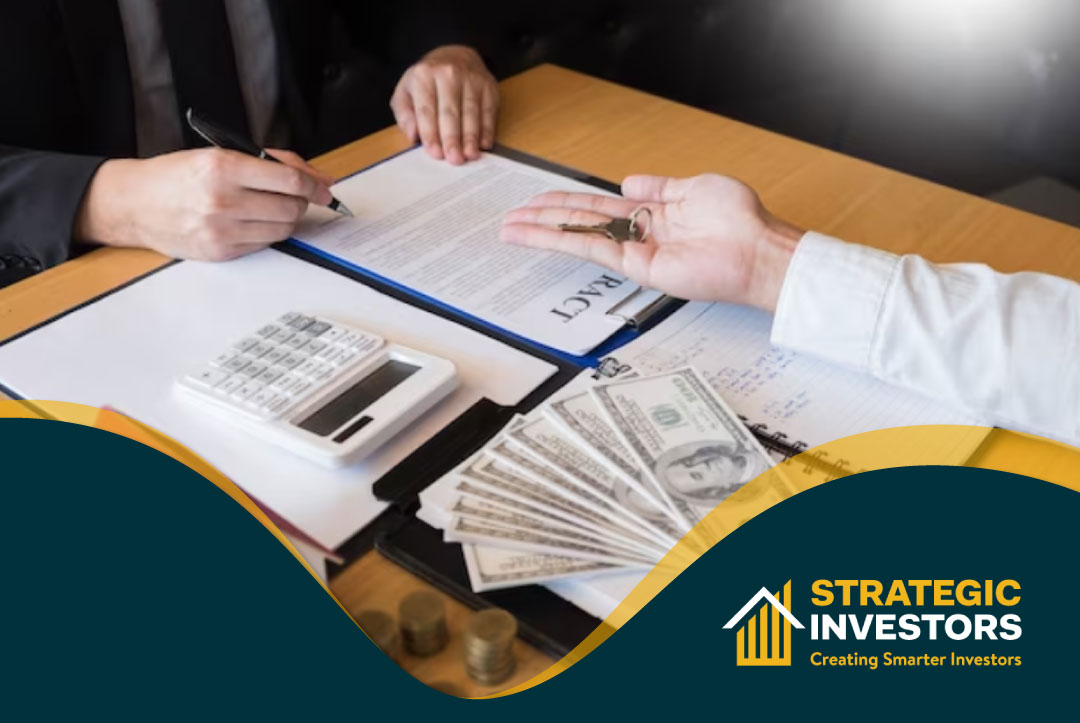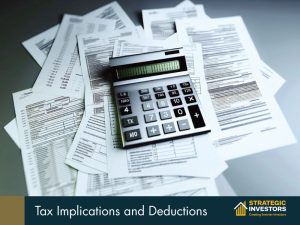
If you’re thinking of investing in property but feel daunted by the associated costs, it’s important to get an accurate picture of all expenses involved.
This guide is here to help. We’ll break down what initial and ongoing outgoings are related to a property investment as well as look at financing matters, tax liabilities, and ways to minimize expenditure.
Key Takeaways
- Investors should be aware of the initial costs associated with property investment, such as deposits, stamp duty and legal fees.
- Ongoing expenses include property management fees, insurance premiums and maintenance/repair costs.
- Strategies for reducing investment property costs include selecting the right property, negotiating fees & charges and conducting regular financial reviews.
Initial Costs of Investment Property
 When it comes to investing in property, one must be mindful of the upfront costs. Such as deposit money, stamp duty and legal fees which will vary depending on a property’s value and location. To avoid any unwelcome financial shockers when budgeting, assessing these various expenses ahead is important for successful investment.
When it comes to investing in property, one must be mindful of the upfront costs. Such as deposit money, stamp duty and legal fees which will vary depending on a property’s value and location. To avoid any unwelcome financial shockers when budgeting, assessing these various expenses ahead is important for successful investment.
Deposit
When making a property purchase, the deposit is typically one of the largest upfront costs and may amount to up to 20% of its value. The size of your down payment has an influence on both loan repayments as well as mortgage insurance premiums. If you are able to put forth larger deposits for your investment home loans, not only will it reduce interest rates but also potentially lower Lenders Mortgage Insurance (LMI) costs in the long run. Thus providing significant savings over time.
Stamp Duty
Investment properties have an associated stamp duty which must be paid in full before ownership is transferred and it differs depending on the state, location, and value of the property. This tax goes to cover all costs related to this transfer for each individual state’s government. The amount of stamp duty you need to pay is based upon your purchase price as well as where exactly you are buying from. So budgeting accurately with these points taken into account can save a great deal of money up front. In some cases there may even be reductions or waivers available – if applicable then double check what regulations they follow that relate specifically to yourself for maximum savings when purchasing your next real estate asset. Our online calculator makes finding out potential cost effective by tailoring results according to appropriate states or territories used during searches- try using it today!
Legal Fees
When purchasing an investment property, it’s essential to include the initial cost of legal fees in your budget. These charges can range from $500 up to $2,500 and usually equate to around 0.5%-1% of the value of the property for U.S investments. Hiring a solicitor or conveyancer is necessary when completing this process as they are experts who will make sure that all documents related to settling are both properly prepared and legally compliant according to applicable regulations before being submitted for approval. To avoid unexpected costs down the line, be sure you allow enough room in your finances plan for these critical expenses!
Ongoing Expenses of Owning an Investment Property
 Owning an investment property requires not only the initial costs but also ongoing expenses for its upkeep. Property management fees, insurance premiums and maintenance/repair charges are necessary in order to preserve the value of this asset. In other words, being prepared for these recurring bills is important so as to have a hassle-free experience with your investment property.
Owning an investment property requires not only the initial costs but also ongoing expenses for its upkeep. Property management fees, insurance premiums and maintenance/repair charges are necessary in order to preserve the value of this asset. In other words, being prepared for these recurring bills is important so as to have a hassle-free experience with your investment property.
Property Management Fees
When investing in property, it’s important to consider the ongoing fees associated with a property manager who provides services such as rent collection, maintenance and tenant screening. Property management fees may range from 5% – 15%, depending on the location of the investment asset, and can be calculated based off either percentage of rental income or through flat-rate charges including administration costs, lease renewals and upkeep expenses. This encompasses council rates that are also part of these service fee calculations.
Insurance Costs
When considering the purchase of an investment property, budgeting for insurance costs such as building and landlord cover is essential. Building protection takes care of any harm done to the dwelling while covering a landowner from losses due to rent arrears or tenant damage with landlord coverage.
The annual premiums for Australian rental properties can range anywhere between $1,511 and $2,056 depending on location. Being cognizant of these figures prior to investing will be beneficial in ensuring sufficient financial planning is undertaken.
Maintenance and Repairs
As a landlord, it is your duty to give tenants an acceptable place in which to live. You must factor into the budget 1-3% of the property’s value for ongoing maintenance and repair expenses. This funds should be set aside as savings reserve so that any unexpected costs can be handled without undue hardship or struggle. Ensuring adequate funding for this purpose will help guarantee a safe living environment at all times!
Financing Your Investment Property
 Understanding the interest rates on your home loan, as well as lenders mortgage insurance (LMI) and related fees and charges associated with your investment property is essential in order to properly calculate the total cost of ownership. It’s important to consider these factors when financing an investment property because they can greatly affect its overall expense.
Understanding the interest rates on your home loan, as well as lenders mortgage insurance (LMI) and related fees and charges associated with your investment property is essential in order to properly calculate the total cost of ownership. It’s important to consider these factors when financing an investment property because they can greatly affect its overall expense.
Home Loan Interest Rates
Interest payments are a major expense of home loans, and locking in an attractive interest rate could result in considerable savings throughout the life of the loan. The amount of your loan’s interest will rely on different elements such as type, its Loan-to-Value ratio (LVR), and how much risk lenders perceive with it. When discussing investment properties, most institutions tend to offer higher interests due to greater perceived risks by them. For example, according to data from November 2023, variable rates averaged at 7.24%. You can benefit economically if you look around for competitive offers or negotiate better deals when looking into investing in property – this may help greatly reduce costs associated with purchase lending.
Lenders Mortgage Insurance (LMI)
When budgeting for an investment property, it’s important to consider the cost of LMI. This fee is applicable if your deposit is under 20%, and covers lenders from potential losses in case you default on the loan. The amount charged ranges between 1-3% of the total loan value. A larger upfront payment will reduce this expense since lower Loan-to-Value Ratios (LVR) mean cheaper premiums.
Loan Fees and Charges
When taking out a loan, fees and charges such as account keeping or package fees, legal costs, mortgage registration fee and property management should be taken into consideration. It is worth noting that these associated expenses can add up over time when investing in a property.
It’s important to weigh your options carefully by comparing different lenders for better terms like discounts/ incentives before signing any contracts. This could lead to significant savings on the overall cost of the transaction. Keep an eye on interest rates charged along with body corporate levies which may affect both borrowing power but also monthly repayments, insurance policies connected to mortgages are something else you will need to take into account too.
Tax Implications and Deductions
 Taxation is an integral factor to consider when investing in properties, as it affects your returns and costs. Being aware of how rental income is taxed, what expenses are tax-deductible and the capital gains rate can assist you in minimizing fees while maximizing profits.
Taxation is an integral factor to consider when investing in properties, as it affects your returns and costs. Being aware of how rental income is taxed, what expenses are tax-deductible and the capital gains rate can assist you in minimizing fees while maximizing profits.
Rental Income Taxation
Rental income from investment properties is subject to the same marginal tax rates as all other income. There are numerous costs associated with these investments that can be deducted and lower your taxable earnings. This includes loan interest, depreciation, fees for property management services and more. When making an investment in a property, it’s important to consider what kind of taxes will apply so you know how much money you’ll actually have after deductions.
Tax Deductible Expenses
Investment property owners can reduce their tax liability by claiming deductions related to the cost of owning the asset. Commonly eligible items for this include interest on a loan, depreciation and expenses incurred from management fees. Maintaining accurate records regarding these costs will help maximize potential deductions when filing taxes. Thus it is advised that one consults with an expert in financial or taxation matters before doing so. Any relevant associated expense should be kept track of as they may also count towards reducing tax burden where applicable.
Capital Gains Tax
When investing in property, it is essential to take into consideration the potential implications of capital gains tax. This expense will be due upon selling an investment and calculated based on your income-tax threshold through factoring in the purchase price versus sale cost. To maximize returns from a property transaction, one can consider available exemptions such as reduced taxation when holding onto a given asset for more than twelve months.
Strategies for Reducing Investment Property Costs
 Choosing the right investment property and negotiating fees can help you reduce associated costs while increasing returns. Regular financial reviews should be conducted as a key strategy for successful investing in property.
Choosing the right investment property and negotiating fees can help you reduce associated costs while increasing returns. Regular financial reviews should be conducted as a key strategy for successful investing in property.
Choosing the Right Property
When it comes to investment property, researching the market and selecting a potential asset can be an effective way of cutting costs and raising returns. Factors for consideration include area location, likely increase in value over time, as well as industry patterns.
Choosing an investable option with substantial growth prospects could prove beneficial both financially-speaking but also when considering future success rates. While this method does involve certain expenses being incurred initially, these are often more than made up by any profits experienced later on down the line.
Negotiating Fees and Charges
By negotiating fees and charges with property managers or insurance providers, one can reduce their expenses over the long term. Through building trustful relationships and maintaining clear communication flows, negotiations may become easier to come by in return for better rates/deals on services used within a property setting.
Regular Financial Reviews
By assessing your investment property’s fiscal performance and making changes accordingly, you can maximize yields while minimizing costs. Carrying out a thorough financial review could expose areas that need improvement, aid in the adjustment of rental rates as well as offer ways to cut expenses.
Doing regular reviews not only helps keep track of how it’s performing, but also make sure it remains productive and aligned with the objectives set for investments.
Summary
In order to make informed decisions and maximize your returns, you need to be aware of the full range of costs associated with owning a property investment. Knowing initial expenses, ongoing fees, financing options as well as tax responsibilities are essential for making sound financial choices in regards to any type of real estate investing. Utilize strategies that will minimize costs when possible so your investments can grow significantly over time.
Frequently Asked Questions

What fees do I pay on a investment property?
When investing in real estate, you’ll need to pay for stamp duty, lenders’ mortgage insurance (LMI), government fees and charges associated with the property’s conveyancing and legal costs, as well as building & pest inspections. It would be wise to allocate a budget towards covering any ongoing expenses that come along with owning this piece of land or residential area.
What is the 2% rule for property investment?
The 2% rule is a strategy for investment property buying that stipulates that the desired gross monthly rent should be equal to, or higher than, two percent of the purchase price. This method suggests it would make an optimal financial decision when investing in real estate.
How do you calculate investment cost?
To ascertain the financial outlay of an investment, you need to add up all associated fixed and variable costs for a full cost assessment. Then divide that total by the net income to calculate your Return on Investment (ROI).
How can I reduce my home loan interest rate for an investment property?
If you are looking to reduce the rate of interest on a home loan for an investment property, one way is by providing a greater deposit in order to lower your Loan-to-Value Ratio (LVR).
Are property management fees tax-deductible?
Property management fees that are used to maintain the property can be claimed as tax deductions, so it is important to keep track of them. These taxes deductible expenses should not go unnoticed for they could help reduce the overall amount owed when filing taxes.













